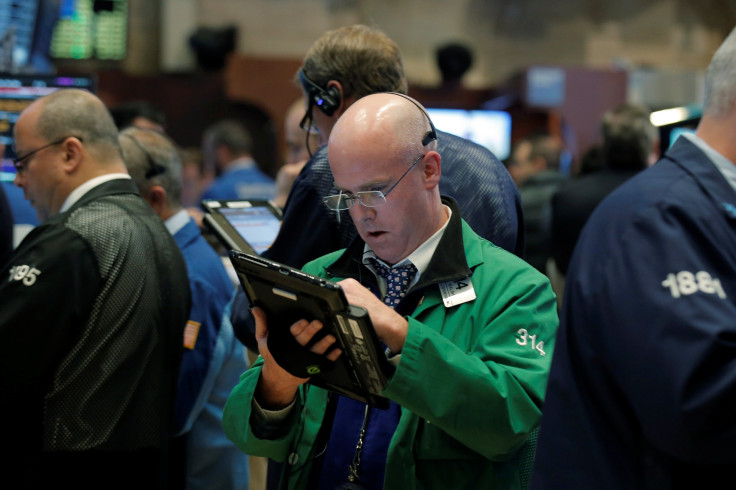Thursday's Stock Market Open: US Equities Plunge As Trump Orders 30-Day European Travel Ban, Oil Drops

KEY POINTS
- Trump has banned for one month travelers from 26 European countries
- NBA season has been suspended
- ECB kept rates unchanged but expanded quantitative easing
Update: 1:10 p.m. EDT:
U.S. stocks have pared some of their steep losses after the Federal Reserve unveiled extraordinary funding actions to help strained capital markets. The Fed said it will extend its purchases “across a range of maturities” to include bills, notes, Treasury Inflation-Protected Securities and other instruments.
Also, the New York Fed desk will offer $500 billion in a three-month repo operation and a one-month operation.
“These changes are being made to address highly unusual disruptions in Treasury financing markets associated with the coronavirus outbreak,” the New York Fed said in a statement
The Dow Jones Industrial Average dropped 1100.57 points to 22,442.65 while the S&P 500 fell 122.37 points to 2,619.01 and the Nasdaq Composite Index tumbled 362.27 points to 7,689.78.
Update: 12:05 p.m. EDT:
U.S. stocks incurred heavy losses as of noon on Thursday.
The Dow Jones Industrial Average dropped 2,037.01 points to 21,516.21 while the S&P 500 fell 216.39 points to 2,524.99 and the Nasdaq Composite Index tumbled 556.56 points to 7,395.49.
Crude futures were trading at $31.32 per barrel.
In Europe markets suffered massive losses as Britain’s FTSE-100 fell 10.25%, France’s CAC-40 plunged 11.85% and Germany’s DAX dropped 11.41%.
Update: 10:10 a.m. EDT:
After trading resumed, Wall Street’s rout deepened
The Dow Jones Industrial Average dropped 2,014.31 points to 21,538.91 while the S&P 500 fell 207.24 points to 2,534.14 and the Nasdaq Composite Index tumbled 552.92 points to 7,399.13.
Crude futures trading at $31.18 per barrel.
Update: 9:50 a.m. EDT:
Trading was halted for 15 minutes after the Dow and S&P 500 both dropped more than 7%.
Original story:
U.S. stocks plunged on Thursday as traders responded negatively to President Donald Trump’s 30-day travel ban on most European countries and mild stimulus measures designed to fight impact of coronavirus outbreak.
The Dow Jones Industrial Average dropped 1,690.12 points to 21,863.10 while the S&P 500 fell 183.63 points to 2,557.75 and the Nasdaq Composite Index tumbled 531.49 points to 7,420.56.
The Dow and S&P officially entered bear market territory based on market close of the recent highs from Feb. 19.
On Wednesday evening, U.S. President Donald Trump imposed a one-month travel ban on 26 European countries – that is, countries which form the Schengen Area, which require no passport checks between internal borders. U.K., Ireland, Croatia, Cyprus, Bulgaria and Romania are not included in the ban as they are not part of Schengen.
The ban does not apply to legal permanent residents of the U.S. nor to immediate family members of U.S. citizens.
The coronavirus has now infected more than 126,000 people around the world and killed at least 4,600.
Trump also asked for lending aid for small businesses and payroll tax relief.
On Thursday, the European Central Bank kept interest rates unchanged but expanded its quantitative easing program by 120 billion euros ($135.28 billion). The ECB also will increase its purchases of government and corporate bonds to keeo market interest rates low, while expanding lending to commercial banks at favorable terms,
“Market moves suggest monetary stimulus has reached its limits,” said Lucas Bouwhuis, a portfolio manager at Achmea Investment. “Most of the stimulus needs to come from the fiscal side and we are just not seeing enough of that yet.”
“President Trump in an extraordinary Oval Office address didn’t offer up major new ideas on stimulus and only said he’d propose a vague payroll tax holiday to Congress without strongly standing up for any firm size/magnitude,” wrote Ernie Tedeschi, policy economist for Evercore ISI. “This effectively kicks the issue to Congress which is still planning to go on recess next week.”
Italian Premier Giuseppe Conte ordered the closure of all the country’s stores except pharmacies and groceries.
“The market will need much more to get its confidence back,” said Mohit Kumar, managing director at Jefferies International Ltd. “The economic slowdown is because consumers won’t spend as they don’t go out or travel -- you can’t make them spend by giving cheaper money. What you need is fiscal stimulus -- helping [small businesses] and helping banks.”
The National Basketball Association has suspended its season after a player on the Utah Jazz tested positive for coronavirus. The National Hockey League said that it is “continuing to consult with medical experts and is evaluating the options” for its season.
“The crux of the angst investors are feeling as the coronavirus spreads surrounds what might happen to consumer spending,” wrote Scott Wren, senior global market strategist at Wells Fargo Investment Institute. “Consumers sitting at home and not out spending money because they fear catching the coronavirus is the ultimate negative outcome. It has been the U.S. consumer who has been driving the recovery bus during this long expansion.”
In U.S. economic data, jobless claims fell by 4,000 to 211,000 for the week ended Mar. 7, according to Labor Department.
The Labor Department also its producer price index fell by 0.6% in February -- the biggest drop in five years – due largely to a decline in energy costs. The data followed a 0.5% rise in January.
Overnight in Asia, markets closed lower. China’s Shanghai Composite tumbled 1.52%, while Hong Kong’s Hang Seng fell 3.66%, and Japan’s Nikkei-225 dropped 4.41%. India’s BSE Sensex plunged 8.18%.
In Europe markets traded sharply lower as Britain’s FTSE-100 fell 6.99%, France’s CAC-40 plunged 7.89% and Germany’s DAX dropped 7.23%.
Crude oil futures plunged 7.25% at $30.59 per barrel, Brent crude dropped 7.07% at $33.26. Gold futures dropped 1.97%.
The euro slipped 0.4% at $1.1225 while the pound sterling fell 1.31% at $1.2653.
© Copyright IBTimes 2025. All rights reserved.





















